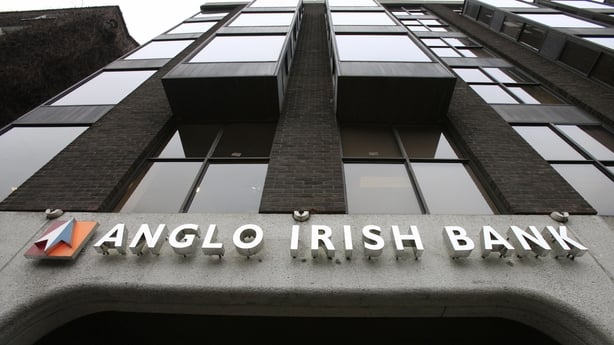Closing speeches have finished in what has become the longest running criminal trial in the history of the state.
Four former bankers from Anglo Irish Bank and Irish Life and Permanent have pleaded not guilty to being involved in a conspiracy to defraud, by misleading investors, depositors and lenders about the true health of Anglo in September 2008.
Former Anglo executives, John Bowe and William McAteer, and former IL&P executives, Denis Casey and Peter Fitzpatrick, deny engaging in a dishonest scheme to make Anglo's corporate deposits look €7bn bigger than they were.
The prosecution says the four engaged in an agreement to send money around in circles so it would come back to Anglo dressed up as a corporate deposit.
€7.2bn was transferred to Irish Life and Permanent from Anglo at the end of September and then transferred back to Anglo via Irish Life Assurance in what the prosecution alleges was a series of "empty" transactions, whose sole purpose was to mislead people who would be looking at Anglo's end of year figures about the health of the bank.
Today, on day 74 of the trial, the court heard closing speeches from lawyers for the two former Irish Life and Permanent executives.

Senior Counsel Michael O'Higgins, who is representing IL&P's former Chief Executive Officer Denis Casey, told the jurors Mr Casey was duped by Anglo Irish Bank because they misrepresented the transaction in their accounts.
He said Mr Casey agreed to one transaction, and Anglo implemented another. He said Mr Casey did not know Anglo would misrepresent or fictionalise the transaction for accounting purposes.
He told the jurors they must acquit his client if they believed what Mr Casey said could possibly be true.
Mr O'Higgins said Mr Casey was not standing over the accounting by Anglo of this transaction.
He said on the contrary, he disapproves of it and says it is wrong. He said it was ridiculous to suggest that Mr Casey should have anticipated the treatment Anglo would give the transaction in its accounts and should have seen that the transaction would not have been of any benefit for Anglo if they accounted for it properly and therefore Anglo was going to cheat.
He said Mr Casey was not significantly concerned with the nuts and bolts of the transaction. He expected it would be accounted for honestly and accurately.
He had no basis for thinking that he was not dealing with accomplished people, full of integrity.
He said there was no evidence that Mr Casey foresaw any "skulduggery" on Anglo's part, but even if he had foreseen this, this would not make him party to a criminal offence.
Senior Counsel Brendan Grehan, representing IL&P's former director of finance Peter Fitzpatrick, asked the jury not to judge his client on the actions of others, over whom he had no control.
He told them their eyes might have watered at the thought of getting their hands on someone who did something really evil in relation to the banking crisis which had caused such misery, but that was not what was happening here.
He said there was no evidence that anyone had stolen anything, that no one lost anything, that no one gained anything, that no one had €7.2bn stashed in a Cayman Islands account.
He said the case against the IL&P defendants boiled down to the single issue of their intent - whether or not they had the same intent as Anglo to mislead the market.
Mr Grehan said the prosecution accepted the motivation of Mr Fitzpatrick and Irish Life and Permanent was to further the "green jersey" agenda - for Irish banks to help each other out.
He also said the prosecution accepted there was nothing unlawful or criminal about the transaction without the ulterior intent alleged by the prosecution.
He said the prosecution were suggesting that IL&P must have known what Anglo was going to do with the transactions in its accounts but he said there was no evidence at all that IL&P had any intention to mislead the market.
He said if there was a smoking gun, the prosecution would be holding it up like 'Exhibit A'.
He said Mr Fitzpatrick supervised the transaction from the IL&P side to ensure it was conducted in a way to protect the interests of his bank.
He said there was no evidence that Mr Fitzpatrick knew anything about how Anglo was going to mislead the market.
He said no one had come forward to suggest that IL&P knew what was being done was "hokey".
He said the prosecution was asking the jurors to make an assumption.
He said there was no evidence that Mr Fitzpatrick had even considered the possibility of what Anglo was going to do let alone signed up to an agreement.
If the transaction had been reported by Anglo appropriately, then we would not be here at all, Mr Grehan said.
He said Irish Life and Permanent imposed terms and conditions on the transaction, and Anglo simply ignored them.
He said Anglo did need money and assistance but he said there was nothing wrong with the assistance IL&P gave to them - it was only wrong if there was an intention to mislead the public, and there was no evidence of that.
Judge Martin Nolan told the jurors the four men were entitled to a fair trial.
He said there was no place for prejudice.
Anglo Irish Bank was probably the most reviled institution in the state but that should play no part in their deliberations, he said.
He will continue charging the jury tomorrow when he will summarise the evidence and inform the jury about the law.
After that a ballot will be held and 12 of the 13 jurors will retire to begin considering their verdict.
An enlarged jury of 15 was originally sworn-in back in January to hear the case because of its length and complexity.

